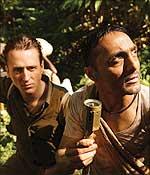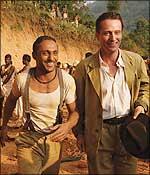 | « Back to article | Print this article |
When Rahul Bose started his career in films with Dev Benegal's English, August, he had one perspective -- that he would only work in art house film projects. But in the 14 years since English, August, as Bose has charted his career, he has broadened his focus, mellowed down a bit and has been receptive to other genres of films.
"I think it is a question of appetite," Bose says as he sits down in New York City to talk about his new film -- Santosh Sivan's Before the Rains. "My daal-chawal is art house world cinema. My Chinese food, my sushi and stuff is the commercial cinema. And so occasionally to change the taste in my mouth and exercise acting muscles that usually don't get exercised, I will do commercial films. There will be a Thakshak or Pyaar Key Side Effects or Jhankar Beats. I want to put my flag in each genre of Indian cinema."
Also Read: Bringing back the British Raj!
"This was not the case when I started my career," the 41-year old actor and filmmaker adds. "But as an actor towards the end of my leading man career -- and I know that I have a few years left -- I have tried other things. Of course, I am not going to be singing and dancing around the trees."
 Before the Rains -- a Merchant Ivory production, set in pre-independence India, falls in the realm of Bose's staple diet of art house cinema. After making rounds for several film festivals, Before the Rains opened in New York and Los Angles on May 9 to mostly positive reviews.
Before the Rains -- a Merchant Ivory production, set in pre-independence India, falls in the realm of Bose's staple diet of art house cinema. After making rounds for several film festivals, Before the Rains opened in New York and Los Angles on May 9 to mostly positive reviews.
In his review Stephen Holden of The New York Times said that 'Before the Rains doesn't dawdle in sentimentality.' He added that 'the film is a dispassionate study of how power, when threatened, ruthlessly exercises its prerogatives.'
And director James Ivory recently told San Francisco Chronicle that he stepped in as one of the producers of the film after he saw a rough-cut. 'This movie is not exactly a thriller,' Ivory said, 'and yet it has a momentum in the way it explores ancient ideas of honor and vengeance that we don't normally expect in a Western-oriented kind of film.'
In Before the Rains, Bose plays the role of TK Neelan, an educated man in Kerala, who is torn between his two loyalties -- to his village, his roots, and also to his British boss who plans on building a road that would benefit his business. TK is the soul of Before the Rains, and Bose's performance is quiet and heart wrenching.
"If you read the script, you know that the character lies between the two worlds," Bose says about TK. "When you know you are playing a heroic character and he is the soul of the script, to play it with that foreknowledge is death. There will be certain arrogance to the work."
"So I think, it was important for me to play the character very simple," Bose adds. "He genuinely loves his village and for the love of his village he aligns himself with Henry Moores (his British boss played by Linus Roache)."
Bose has acted with leading art house filmmakers -- names like Sivan, Benegal, Aparna Sen and Buddhadeb Dasgupta. Before the Rains is Bose's first film with Sivan, but he recently completed another film with the director -- Tahaan. And Bose is also a filmmaker himself. So when he steps on a set, he is aware of how the shoot is progressing.
"I have never told a director what shot to take and what not to take, but I know that there are beats in a scene and I look to see if the director is capturing those beats," Bose says. He adds that is it not his performance that he is most concerned about. But if a particular director misses those key elements in a scene, Bose may just turn around and make a brief comment.
 "But with Santosh I wouldn't have the audacity to say so and second, there would never be a need to say that," he adds. "He has the music in his head."
"But with Santosh I wouldn't have the audacity to say so and second, there would never be a need to say that," he adds. "He has the music in his head."
Sivan wore two hats on Before the Rains -- the cinematographer and the director. Bose recalls a conversation he had with Sivan, where the filmmaker commented that he can never grasp how a scene is shaping up until he views it from his camera.
"It's only when he puts his eye behind the eye piece -- and he is one of the few cinematographers who keeps the other eye open as he likes to see through the eye piece and also see what is happening outside through the other eye -- only then he can make out what the actors are doing," Bose says.
Sivan behind the camera can start to shoot from someone's fingertips, going up to the actors' faces and then move to something small like a butterfly. He is spontaneous with his camera, and the actors just have to keep on acting.
"He directs with his camera," Bose adds. "For me it was never 'should I talk to the cinematographer or the director?' I got him two-in-one."
Next up for Bose is another art-house film -- his third production with Aparna Sen -- The Japanese Wife. And Bose is very excited about the project.
"The Japanese Wife has the potential of being one of the most remarkable films to come out of India -- if it is finished the way I think it will be," Bose says. He believes that the film could surpass Sen's first film 36 Chowringhee Lane in the way it is shot.
"It is an elliptical, beautiful, fragile love story and it's so sensitively written -- or rather unwritten," Bose adds. "There are so many things unsaid. It was one of the toughest shoots I have had in my life. English, August and The Japanese Wife are bookends to my career and two of the toughest shoots, but massively satisfying."